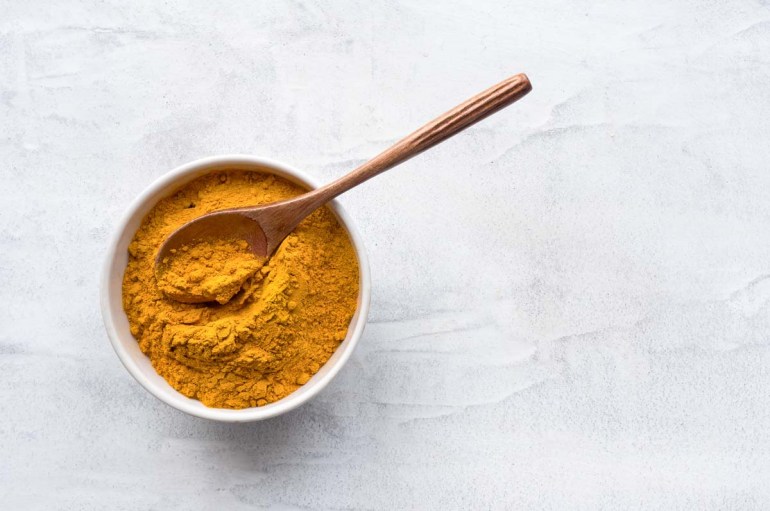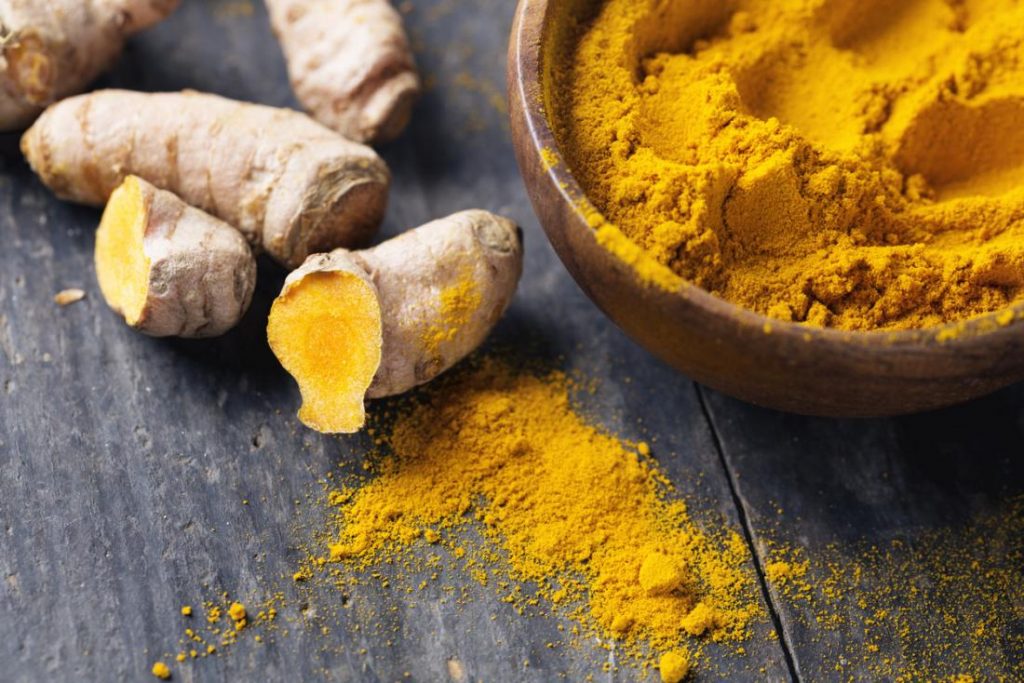Ingredient of the month: Curcumin
Ingredient of the month: Curcumin
I’m originally from India, so turmeric has always been a big part of my life, starting in my childhood. Apart from my family using it every day for cooking, I remember concocting natural face masks with my sisters to soothe and brighten our skin after sunburns after day-long trips to the pool. My grandma would even apply haldi, or turmeric paste (turmeric powder mixed with water), on our cuts to stop bleeding, which I still do! Although these natural remedies have been passed down by our ancestors for generations, it was only later in life, when I took a deeper interest in nutrition, that I was truly humbled by what I learned about the power of plant-based medicine.
We know that for centuries turmeric has been used in Ayurveda and Chinese medicine for treating and preventing a number of health conditions. In the last two decades or so, modern science has caught up with this knowledge and uncovered a wide range of benefits associated with this powerful spice, including joint health, heart health, antioxidant properties and gut health.
But if you are looking for effective results from this spice, especially when it comes to dealing with the above issues, then you are better off directly consuming curcumin, one of turmeric’s components!

A bit about curcumin
Turmeric has more than 300 naturally occurring components but one group, namely curcuminoids, is known to provide the most health-promoting benefits. Curcumin, a polyphenol (micronutrients naturally occurring in plants), is considered to be the most active component of this group. It gives turmeric its bright yellow colour and possesses potent anti-inflammatory and antioxidant properties.
Today, this ingredient has been widely accepted in the medical community as hundreds of clinical trials have been conducted on curcumin. If you are looking for a natural solution to enhance your everyday health requirements, then look no further!
7 ways curcumin can help you daily
1. Deal with anxiety & possibly depression
Research suggests that almost 15–20% of the world’s population suffers from depression at any given time, many of whom suffer from the side-effects and drug–food interactions from the various pharmaceutical antidepressants available on the market.(1)
Research also suggests that there is a connection between inflammation and depression, and that dietary deficiency of DHA fatty acids (docosahexaenoic acid) is linked to several cognitive disorders including anxiety.(2) (3)
Studies state – curcumin can:
be perceived as a novel and safe anti-depressant, as it has the potential to reduce depressive symptoms along with reducing anxiety, displaying no toxicity to the human body. (1)
inhibit the activity of an enzyme that is responsible for the degradation of our neurotransmitters, such as serotonin & dopamine, thus regulating anxiety and stabilising mood. (1)
inhibit the increase of cortisol (the body’s main stress hormone) caused by stress. (4)
improve DHA synthesis. This means it increases the body’s ability to covert ALA (alpha-lipoic acid) to usable DHA, which is crucial for brain development and protection. (3)
ALA cannot be made in the body, so it needs to be obtained from of our diet and its conversion efficiency is generally slow and low! This is particularly important for plant-based eaters who don’t eat fish that are rich in DHA, and are looking to optimise their nutritional requirement, in this case, their omega-3 intake.
2. Support pain relief in the muscles and joints caused by physical/emotional stress
When we exercise, although our body builds muscle and strength, it also undergoes a significant amount of physical stress, depending on the frequency and intensity of the exercise. If this is ignored, it can lead to accumulated oxidative stress (an imbalance between free radicals* and antioxidants in our bodies) and prolonged inflammation, leading to serious chronic injuries and problems such as osteoarthritis and inflammatory rheumatoid arthritis. (18)
Emotional stress too, can lead to a buildup of accumulated oxidative stress and prolonged inflammation causing stress-related illnesses such as diabetes, heart attack, memory impairment and other autoimmune conditions.
Studies state – curcumin can:
aid recovery and reduce delayed onset muscle soreness (DOMS), the pain you suffer after workouts. (5)
manage exercise-induced inflammation triggered by excessive strenuous exercise, without negatively impacting our natural inflammatory responses after exercise. (6)
reduce exercise-induced oxidative stress due to its antioxidant properties. (6)
Relieve pain and stiffness in the joints resulting from rheumatoid arthritis and osteoarthritis. (7) (8) (9)

3. Support gut health
Research suggests that our immune system is heavily affected (90%) by the balance of good and bad bacteria in our gut. Imbalances in the microbiome (the ecosystem of our microbes), have been linked to a number of serious issues including obesity, depression, autoimmune disorders, cancer, heart disease, fibromyalgia, asthma, eczema, autism, diabetes, and inflammatory arthritis.
Studies state – curcumin can: (10)
improve intestinal inflammation including being used for the treatment of IBD and issues in the digestive tract.
act as a prebiotic on the gut to increase the amount of lactobacillus and bifidobacterium (good bacteria), keeping the bad bacteria in check by not allowing them to multiply.
influence the diversity of our microbiota (microbes in our gut).
protect intestinal permeability
Further studies on humans are required to extend the current gut microbiota outcomes.
4. Reduce monthly menstrual cramps and PMS symptoms
For a lot of us women, experiencing menstrual cramps and PMS during our monthly cycle can be very debilitating, to the point where it stops us from functioning properly until the pain subsides. For me it’s the first two days of my monthly cycle when I always have to resort to ibuprofen. But, according to Dr Jolene Brighten, a functional medicine naturopathic physician, having non-steroidal anti-inflammatory drugs (NSAIDS) like ibuprofen can make PMS symptoms worse over time by suppressing ovulation and subsequently resulting in lower progesterone (a steroid hormone that stimulates the uterus to prepare for pregnancy).
During our menstrual cycle, hormone-like substances called prostaglandins that are responsible for regulating the female reproductive system, trigger levels of inflammation. Researchers suggest that women with more prostaglandins experience greater abdominal and back pains and women with high sensitivity CRP (biomarker for inflammation) experience greater PMS symptoms.
Studies state – curcumin can: (11)
help to reduce PMS symptoms because of its ability to modulate neurotransmitters.
reduce excessive inflammation and alleviate menstrual cramps/pain in the body.
5. Slow down ageing
Ageing is inevitable! But let’s face it, we all want to look and feel great for as long as we live. I’m sure you’ll agree: our ultimate goal as we age is to remain independent, have full mobility and hold meaningful conversations until the end.
Accelerated ageing is primarily linked to oxidative stress. This is because free radicals can impair our DNA repair system leading to decreased cellular and physiological functioning and promoting apoptosis (death of cells) and inflammation. It is believed that slowing down ageing and postponing the onset of age-related diseases can be achieved by blocking NF-kB dependant inflammation. (NF-kB is a protein complex that controls replication of DNA, cytokine production and cell survival.)
Studies state – curcumin can: (12) (13)
reduce oxidative stress by neutralising the accumulation of free radicals in the body that cause DNA damage, due to its antioxidant properties.
inhibit NF-kB levels that are responsible for the onset of sarcopenia (loss of muscle mass and strength as a result of ageing) and many other age-related diseases.

6. Manage psoriasis
Psoriasis is an autoimmune condition in which the skin production process happens much faster than normal, i.e. skin cells deep in the skin rise to the surface and fall off much quicker than normal, and this typically appears as thick, red, scaly lesions.
I can relate to this condition as I suffer from psoriasis on my scalp and around my ears. Having suffered with this extremely uncomfortable and sometimes embarrassing condition for 22 years, I felt helpless after trying countless products only to realise they provided a temporary solution, or they brought a range of side effects with them.
Studies state – curcumin can: (14)
may reduce the oxidative stress of psoriatic lesions.
protect the skin by reducing inflammation and by neutralising free radicals* by modulating the cytokines responsible for development of psoriasis.
7. Boost immunity and lower your risk of developing chronic disease/condition
The anti-inflammatory and antioxidative properties of curcumin play a key role in boosting immunity and in the prevention and the treatment of chronic inflammation conditions, including rheumatoid and osteo arthritis, lupus, cancer, diabetes, cardiovascular disease, neurological diseases such as Alzheimer’s and Parkinson’s, inflammatory bowel disease (IBD), and pulmonary diseases.
Studies state – curcumin can: (15) (16)
suppress many molecules such as NF-kB that control the inflammatory proteins that are our body makes. NF-kB is believed to play an important role in many chronic conditions as it travels into the nuclei of your cells and turns on the genes related to inflammation.
Bioavailability and dosage (17)
In a given amount of turmeric, curcumin represents between 3–6% of it. In order to reap the benefits, you would have to either consume large amounts of turmeric – which isn’t really practical and wouldn’t taste great – or supplement with high-quality curcumin.
Curcumin is fat-soluble and should be consumed with some amount of fat to increase its absorption.
Curcumin has very poor bioavailability, meaning it is not absorbed easily in the body. Some studies suggest that once consumed, 75% of it is excreted out, and another study found that only 60–65% of it was absorbed by the body.
A pinch of piperine (the active ingredient that gives black pepper its pungency) or back pepper increases curcumin’s bioavailability by 2000%.
The delivery mechanism, i.e. the format (liquid, capsule, soft gel) and technology used to deliver curcumin to your body is crucial as you want to ensure that the product you buy will be absorbed into your body effectively to provide the results you want! From all the novel technologies explored, liposomal technology, which delivers curcumin in liquid form, is considered to be one of the best. It has been studied and tested the most and provides at least eight times more absorption than standard methods.
In terms of dosages, curcumin is a plant-based ingredient and is fairly safe even at intakes as high as 12g/day over a three-month period. However, most studies conducted based their doses between 400–1000mg/day. It really depends on your symptoms and how bad your pain is. Personally, 500mg/day works best for me. But you can also reference the related study as guidance (hyperlinked above) to decide on dosage.
Safety
Recently, there have been cases where turmeric and curcumin products have been contaminated with lead chromate, which is also bright yellow in colour and is a strong neurotoxin that is considered dangerous in any quantity. Make sure to purchase your products from a reliable source and ensure they conduct third-party testing to ensure the safety of the product.
As with all herbal or plant-based supplements, talk to your healthcare practitioner before taking curcumin if you are taking any other medications or supplements.
To summarise, curcumin is such a rounded ingredient in terms of enhancing your everyday health. It fascinates me how our ancestors knew about the healing properties of turmeric and therefore curcumin back then, and relied on it to cure many types of conditions and diseases.
I would love to know if you use curcumin and if so, which one works for you? How has it helped you? Share your experiences with this community so that we can all learn about your individual journeys! Please comment below or send me an email.
* free radicals
Free radicals are byproducts / waste products of chemical processes in our bodies. By nature, they are single atoms that scavenge the body in an effort to be in pairs like other electrons. While trying to achieve this, they damage or mutate healthy cells and continue to do so, creating a chain reaction damaging thousands of cells.
Although they are vital in small amounts as they support our immune system and metabolic balance, an excess amount of it causes cell damage/oxidative stress.
((Editor’s note: The content on this blog is based on research and suggestions made by health professionals, but it shouldn’t take the place of advice and/or supervision from your medical professional regarding diagnosis, prevention, and/or treatment of health problems. Always seek medical advice if you have any concerns).)
Studies referenced

